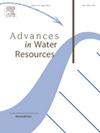A stochastic modeling framework for radionuclide migration from deep geological repositories considering spatial variability
IF 4.2
2区 环境科学与生态学
Q1 WATER RESOURCES
引用次数: 0
Abstract
Considering the influence of uncertainties on radionuclide migration from deep geological repositories (DGR) is of great significance for safety assessment. However, stochastic modeling for DGR safety assessment remains challenging due to the high computational requirements of handling large regional scale models with multiphysics coupling, high-dimensional random inputs, and long simulated durations. This article introduces an efficient numerical framework to tackle this set of challenges. Specifically, the proposed framework relies on three key components, including efficient solutions of stochastic Darcy equations, propagation of stochastic quantities, and efficient solutions of stochastic mass transport equations. Unknown stochastic solutions are approximated by summing a series of products involving random variables and deterministic components. Alternating iterative algorithms are then proposed to decouple the original stochastic problems into deterministic equations for the spatial components, one-dimensional stochastic algebraic equations for the random variables, and one-dimensional ordinary differential equations for the temporal components. These deterministic equations can be solved efficiently using existing solvers, allowing the handling of large-scale problems. The one-dimensional stochastic algebraic equations can be solved efficiently using a sampling strategy, allowing the handling of high-dimensional stochastic state spaces. The one-dimensional ordinary differential equations can be solved cheaply and further accelerated using a time-parallel algorithm, allowing the handling of long simulated time scales. Furthermore, a similar solution approximation and iterative algorithm are also used to propagate stochastic quantities from stochastic Darcy flow to stochastic mass transport. Numerical examples with up to 122 random variables and a simulated duration of one million years demonstrate the promising performance of the proposed framework. The numerical results demonstrate that the developed stochastic framework achieves accuracy comparable to Monte Carlo simulations while significantly improving computational efficiency by two orders of magnitude. Moreover, the evolutionary probability density functions obtained from our stochastic simulations indicate that the proposed framework could potentially serve as an efficient and robust tool for DGR risk assessment.

考虑空间变异性的深部地质储存库放射性核素迁移的随机建模框架
考虑不确定性因素对深埋库放射性核素迁移的影响,对深埋库安全性评价具有重要意义。然而,由于处理具有多物理场耦合、高维随机输入和长模拟持续时间的大区域尺度模型的高计算要求,DGR安全评估的随机建模仍然具有挑战性。本文介绍了一个有效的数值框架来解决这一系列挑战。具体而言,所提出的框架依赖于三个关键组成部分,包括随机达西方程的有效解、随机量的传播和随机质量传递方程的有效解。未知随机解是由一系列包含随机变量和确定性分量的乘积求和来逼近的。然后提出交替迭代算法将原始随机问题解耦为空间分量的确定性方程、随机变量的一维随机代数方程和时间分量的一维常微分方程。这些确定性方程可以使用现有的求解器有效地求解,从而允许处理大规模问题。采用采样策略可以有效地求解一维随机代数方程,从而可以处理高维随机状态空间。一维常微分方程的求解成本较低,并且可以使用时间并行算法进一步加速,从而可以处理长时间的模拟时间尺度。此外,还采用类似的近似解和迭代算法将随机量从随机达西流传播到随机质量输运。具有多达122个随机变量和100万年模拟持续时间的数值实例表明,所提出的框架具有良好的性能。数值结果表明,所开发的随机框架可以达到与蒙特卡罗模拟相当的精度,同时显著提高了两个数量级的计算效率。此外,从随机模拟中获得的进化概率密度函数表明,所提出的框架可以作为一个有效和稳健的DGR风险评估工具。
本文章由计算机程序翻译,如有差异,请以英文原文为准。
求助全文
约1分钟内获得全文
求助全文
来源期刊

Advances in Water Resources
环境科学-水资源
CiteScore
9.40
自引率
6.40%
发文量
171
审稿时长
36 days
期刊介绍:
Advances in Water Resources provides a forum for the presentation of fundamental scientific advances in the understanding of water resources systems. The scope of Advances in Water Resources includes any combination of theoretical, computational, and experimental approaches used to advance fundamental understanding of surface or subsurface water resources systems or the interaction of these systems with the atmosphere, geosphere, biosphere, and human societies. Manuscripts involving case studies that do not attempt to reach broader conclusions, research on engineering design, applied hydraulics, or water quality and treatment, as well as applications of existing knowledge that do not advance fundamental understanding of hydrological processes, are not appropriate for Advances in Water Resources.
Examples of appropriate topical areas that will be considered include the following:
• Surface and subsurface hydrology
• Hydrometeorology
• Environmental fluid dynamics
• Ecohydrology and ecohydrodynamics
• Multiphase transport phenomena in porous media
• Fluid flow and species transport and reaction processes
 求助内容:
求助内容: 应助结果提醒方式:
应助结果提醒方式:


